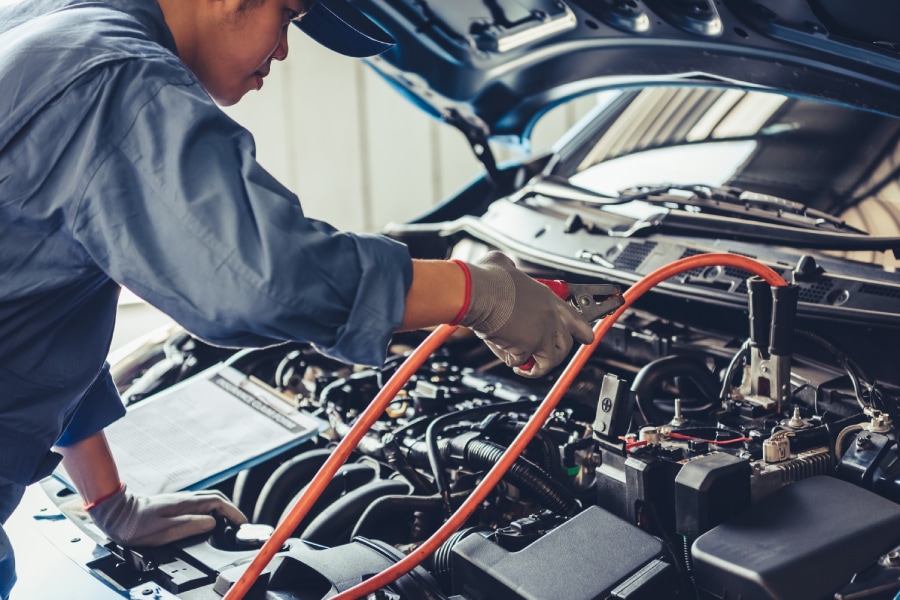As per the Department of Transportation, summer remains the most unsafe driving season. During the summer months, the rate of fatal accidents goes up by more than 18% compared to the other months. Some of the main factors contributing to the increase in summer accidents are an increase in road work and more vacation travel which yields road congestion.
With this information in mind, it’s a good idea to familiarize yourself with a few summer driving safety tips before going out for a summer trip. While the planning and risk prevention phase involved in preparing for summer driving will take a bit of your time, the benefits are well worth it. For instance, you can lessen the potential of dealing with a fatal crash or inconvenient vehicle breakdown.
To help keep you safer on the road this summer, we’ve put together a few tips to follow before you go out for any summer driving.
1. Service Your Vehicle
Having your vehicle maintained regularly by a professional mechanic is vital in ensuring that it is in excellent working condition. A properly maintained vehicle can greatly reduce the chances of a breakdown or accident resulting from mechanical failures. As an added benefit, a properly serviced car delivers superior fuel economy, enhanced handling, and better tire life.
Some of the potential mechanical failures you may be safeguarded from when using a serviced vehicle include:
- Faulty windshield wipers
- Tire defects
- Steering issues
- Lights failure
- Faulty brakes, etc.
2. Wear Seat Belts
It may be old news at this point, but it’s always worth mentioning that you and the other car passengers must buckle up at all times when riding. Always wearing your seat belt means you are setting a good example for others in your vehicle. If you’re driving with small children, also make sure that booster seats, car seats, or child safety belts are properly installed and of the correct size.
3. Carry The Best Emergency Roadside Kit
You may maintain the vehicle accordingly, but accidents may happen at any time because of unforeseen issues. Since there is always a chance of finding yourself in the middle of an unplanned situation or requiring emergency assistance, here area few essential items that your emergency roadside kit must have.
- A mobile phone and its charger
- Flashlight
- First aid kit
- Basic repair tools
- Drinking water and non-perishable food like potato chips
- Medicine
4. Check Maximum Weight
When packing for your summer trip, avoid the allure of exceeding the payload capacity of your vehicle. Check with your particular owner’s manual to be sure of the maximum weight including passengers and cargo that the automobile can carry safely. While you’re at it, be sure that the visibility of your vehicle windows is not obstructed before you head out.
5. Avoid Bad Driving Behaviors
Some potential risky driving behaviors which you should avoid are:
- Distracted Driving—Do not let any form of distraction such as texting or talking with passengers to take your attention from driving.
- Impaired Driving—For driving that is safe and responsible, avoid the use of alcohol and drugs before and during your trip. Alcohol and drugs are known for impairing your judgment, memory, perception, motor skills, etc., putting not only the driver but also passengers and all other road users at risk.
- Speeding—Driving speed must be within the recommended safe limit.
6. Manage Summer Allergies
One out of every five Americans suffers from allergies that impact day-to-day life. Driving with allergy symptoms that are distracting such as frequent sneezing and runny eyes can be risky. What is more, most allergy medications may make you sleepy.
See to it that the inside environment of the car is clean, well-ventilated and dry to safeguard you from allergies and their symptoms.
In Conclusion
Apart from the safety tips already given, also follow all the applicable road safety rules. As the driver, you are in control not only of your safety but also that of your passengers and other users of the road. Road well-being rules necessitate you to stay alert, stop texting, follow speed limits, and share the motorway with pedestrians, cyclists and other drivers alike.



